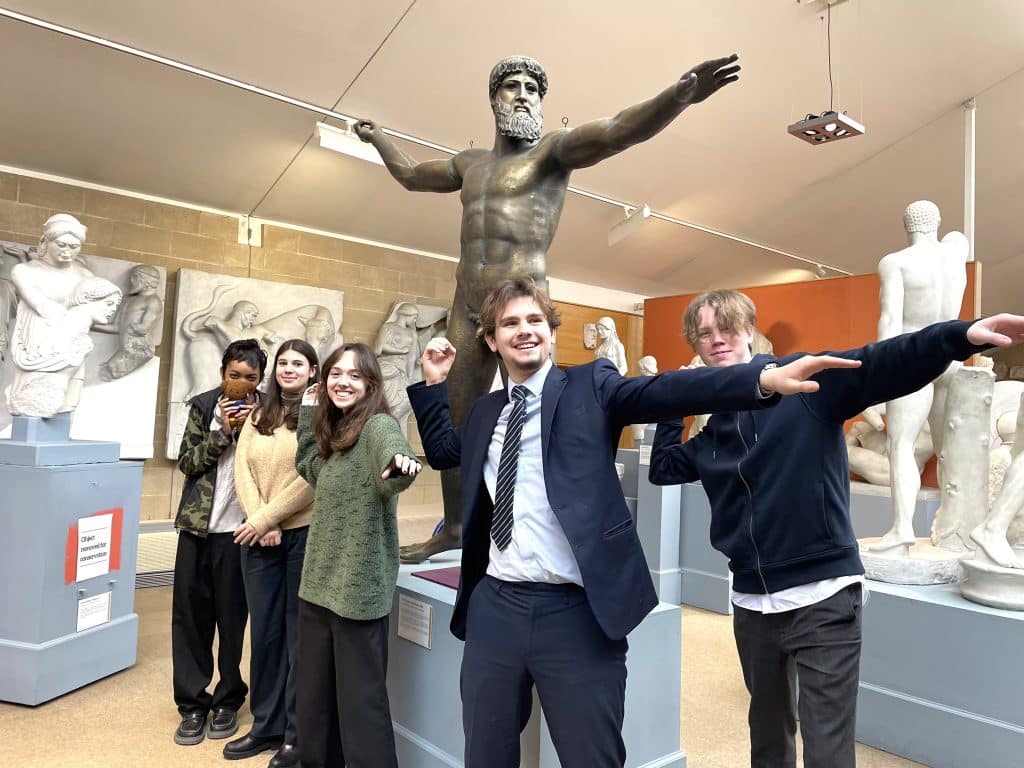Knowledge of Classics enhances our understanding of literature, history, art, philosophy, drama and humanity itself. We aim to enrich pupils’ experiences of other subjects and develop their cultural capital. At Forest, pupils have the opportunity to study three Classical subjects: Latin, Classical Greek and Classical Civilisation.
The goal of learning Latin and Classical Greek is to equip students with the skills they need to be able to read and appreciate ancient literature in the original language. The study of grammar also deepens students’ understanding of English and other modern languages.
Classical Civilisation is the study of Greek and Roman literature and material culture, entirely in English translation. Students develop their skills in analysing and interpreting sources and explore how classical sources reflect issues relevant today, including ideas about faith, politics and identity.
Our rich curriculum includes:
- Varied lessons with plenty of opportunity for debate
- Practical experience of analysing material culture by examining replica artefacts
- Museum and theatre trips, lecture days and trips abroad to Italy or Greece
- The opportunity to design and lead activities for Mythology Club
GCSE and A-level Overview
The OCR in Latin and Classical Greek enables students to:
- Develop their knowledge of Latin/Greek language in order to read and understand original literature
- Develop their understanding of ancient literature, values and society through the study of original texts
- Select, analyse and evaluate evidence from the literature
- Develop insights into the relevance of the ancient world to our understanding of our modern world and diverse cultures
- Deepen their understanding of English and other languages
- Develop research and analytical skills which will empower them to become independent learners
- 3 written examinations at GCSE / 4 written examinations at A-Level
The OCR in Classical Civilisation enables students to:
- Gain a broad understanding of a range of literary and cultural sources
- Use their knowledge and analytical skills to gain insight into the classical world
- Demonstrate an informed response to the material studies, selecting a range of evidence to support an argument
- Develop awareness of how classical sources reflect issues relevant to today, such as questions of gender, belief, sexuality and citizenship
- 2 written examinations at GCSE / 3 written examinations at A-Level
Assessment at GCSE and A-level
Latin and Classical Greek GCSE:
- Language – written examination (50% of total)
- Prose Literature – written examination (25% of total)
- Verse Literature – written examination (25% of total)
Classical Civilisation GCSE:
- Thematic Study: Myth and Religion – written examination (50% of total)
- Literature and Culture: War and Warfare – written examination (50% of total)
Latin and Classical Greek A Level:
- Unseen Translation – written examination (33% of total)
- Prose Comprehension – written examination (17% of total)
- Prose Literature – written examination (25%) of total
- Verse Literature – written examination (25% of total)
Classical Civilisation A Level:
- The World of the Hero – written examination (40% of total)
- Greek Art – written examination (30% of total)
- Love and Relationships – written examination (30% of total)
Curriculum Maps – All Years
The-Academic-Curriculum-Prospectus-2024
Forest Curriculum Map – Year 9 – Classical Civilisation
Forest Curriculum Map – Year 10 – Classical Civilisation
Forest Curriculum Map – Year 12 – Classical Civilisation
Forest Curriculum Map – Year 13 – Classical Civilisation
Forest Curriculum Map – Year 9 – Greek
Forest Curriculum Map – Year 10 – Greek
Forest Curriculum Map – Year 11 – Greek
Forest Curriculum Map – Year 12 – Greek
Forest Curriculum Map – Year 7 – Latin
Forest Curriculum Map – Year 8 – Latin
Forest Curriculum Map – Year 9 – Latin
How can Latin change the world?
“carpe diem, quam minimum credula postero” – “pluck the day, trusting as little as possible in the next one”
When Horace tells us to “carpe diem” he is not encouraging us to seize the day by embarking on a great adventure. Rather to pluck the day, or even to taste the day, as if savouring a glass of wine. As a follower of Epicurean philosophy, he believed in moderation and living in the moment.
How can Classical Greek change the world?
“Athens went from strength to strength and proved how noble a thing equality is.” (Herodotus, ancient Greek historian)
Athens was the birthplace of democracy and many more concepts and ideas which influence the world today. By studying the history of this city and the literature which survives from it, we can explore our own culture. Does a democracy really ensure equality?
How can Classical Civilisation change the world?
“Love shook my soul, like a wind buffeting oak-trees on a mountain” Sappho (ancient Greek lyric poet)
Sappho is perhaps the most intriguing voice from the ancient world. She was a female poet who achieved great fame in an extremely patriarchal world. The way she expressed the feelings of love and desire have shaped subsequent generations, down to the present day. By exploring her poetry, we can challenge our own ideas about love, sex and gender.



